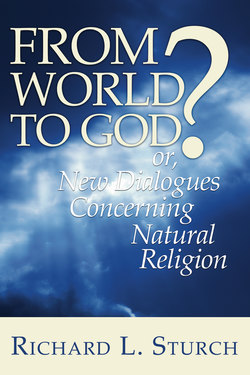Читать книгу From World to God? - Richard L. Sturch - Страница 5
Introduction
Оглавление2 David Hume’s Dialogues concerning Natural Religion, written in 1761 but not published until 1779, after his death, remain, and rightly, one of the most celebrated of all writings on this subject. No one venturing to write about natural theology can afford not to read and use them, whether to agree or disagree. Indeed, some seem really to think that they said the last word on the subject. The present work, though it too purports to be a set of dialogues concerning natural religion, or natural theology, covers a rather different area from that of Hume’s work. Ostensibly, Hume was only concerned to discuss the possibility of reasoning from the world about us to the attributes of God, not to His actual existence. Occasionally, indeed, he does depart from this, for instance in the discussion of what he calls the “a priori” argument (what we should nowadays call the “cosmological”) in Dialogue IX. To a great extent he succeeded in making his ostensible point; most modern treatments of the subject, however favorable to natural theology they may be, are reluctant to argue for more than the bare existence of a God from what can be seen in the world. His attributes have to be known some other way.
The present essay follows the same line. It can perhaps claim to be a more balanced set of dialogues than Hume’s. Of Hume’s three speakers, Philo has nearly all the good arguments, and Demea is largely a figure of fun. This is not to accuse Hume of intellectual dishonesty. He was simply following in an old tradition. Most of Plato’s dialogues are equally one-sided; so are those of Berkeley.
Hume himself defended a dialogue form on the grounds that “opposite sentiments, even without any decision, afford an agreeable amusement.” But what follows here is more of a dialogue within myself, and I hope it is fair to all three participants. Although to a certain extent each character descends from one of Hume’s three, each also represents, to a much greater extent, my own views, thoughts, and doubts. Leslie, who descends to some extent from Cleanthes, is as a rule the closest approximation to myself. But much of the time Geoffrey, who is a kind of more pedestrian Philo, represents my doubts, and my own awareness of weaknesses in the theistic arguments. He is, if you like, my attempt to be honest with myself. He also from time to time gives a voice to other atheist or agnostic views with which I have no personal sympathy but which obviously ought to be mentioned; as a rule Geoffrey introduces these with a note of doubt in his voice.
Myra, on the other hand, is not meant to be the butt that Demea is, though, like him, she takes less part in the dialogue than the other two (until near the end). She chips in mostly when Geoffrey starts attacking, not Leslie’s arguments, but Christianity or theism itself. She really stands for my doubts in the opposite direction to “Geoffrey.” Both she and Leslie fully acknowledge the Christian revelation; but Myra is not very much bothered with either Leslie’s arguments or Geoffrey’s counters, except, as I have said, when the latter tries to show that theism is not merely unproven but false. She takes the Biblical picture of God as basic; she sees the world, not as a foundation for belief in Him, but as a place in which His handiwork can be seen, because we know it is His handiwork before we look.
A second difference is that these dialogues, as they go on, move more and more in the direction of a discussion of the implications of modern science, which was not the case with Hume’s. Questions about evolution and the “big bang” have brought actual scientific theories into the contemporary debate far more than their predecessors did in the eighteenth century. It will be fairly obvious to readers that in scientific matters I have depended entirely upon the popularisers, and the gratitude that I owe them is great—for a great deal of fascinating reading as well as for their unwitting help in producing these dialogues. Echoes of their ideas will occur over and over again. At times, so as not to misreport them (especially when I disagree with them) the echoes are more like echoes of their words than just their ideas. I hope it need not be said that none of these writers is in any way whatever responsible for the use (or misuse) made herein of anything that they wrote; still less for anywhere I have failed to understand what they were getting at. I also hope that they will forgive me for not encumbering the text with exact references to their remarks. I have however included brief references and “further reading” notes at the end of each Dialogue, and a bibliography at the end of the whole.
